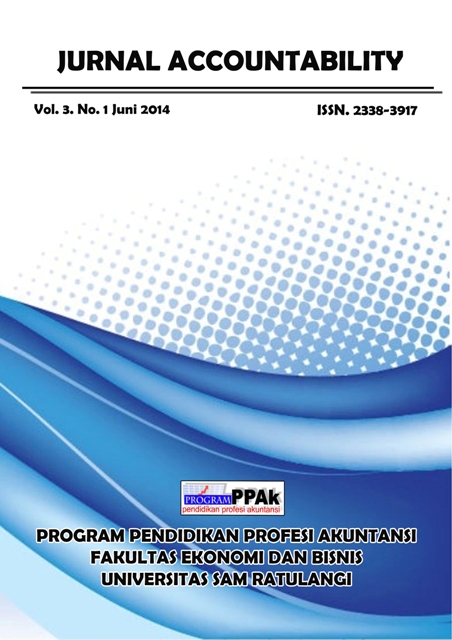ANALISIS EFEKTIVITAS DAN KONTRIBUSI PAJAK KENDARAAN BERMOTOR TERHADAP PENERIMAAN PENDAPATAN ASLI DAERAH DI PROVINSI MALUKU UTARA
Abstract
ABSTRAK
Reformasi di bidang perpajakan dilakukan oleh pemerintah pusat, guna melaksanakan otonomi daerah, yakni dengan membagi sumber penerimaan negara berupa pajak pusat dan pajak daerah. Pajak kendaraan bermotor merupakan salah satu jenis pajak daerah yang sangat potensial dalam meningkatkan penerimaan daerah bagi provinsi maluku utara sebagai provinsi kepulauan, dimana moda transportasi utama dalam menghubungkan seluruh wilayah diprovinsi maluku utara adalah mengunakan kendaraan bermotor, baik yang dioperasikan didarat maupun dilaut. Tujuan dari penelitian ini adalah untuk mengetahui efektivitas dan kontribusi penerimaan pajak kendaraan bermotor terhadap pendapatan asli daerah (PAD). Data yang telah diolah kemudian dianalisis dengan menggunakan analisis deskriptif kualitatif. Hasil penelitian menunjukan bahwa penerimaan pajak kendaraan bermotor diprovinsi maluku utara efektif. Sementara kontribusi pajak kendaraan bermotor terhadap penerimaan PAD adalah kurang baik. Disisi lain efektivitas dan kontribusi pajak kendaraan bermotor terhadap PAD menunjukan tren yang menurun. Hal ini menunjukan bahwa dinas pendapatan dan pengelolaan aset daerah provinsi maluku utara sudah baik dalam mengelola penerimaan pajak kendaraan bermotor namun belum serius dalam mengoptimalkan potensi penerimaan pajaknya.
Kata kunci : Otonomi daerah, Pajak Pusat, Pajak Daerah, Pajak Kendaraan bermotor, Kontribusi, Efektivitas.
Â
ABSTRACT
Taxation reforms carried out by the central government, in order to implement regional autonomy, namely the sharing of resources in the form of central tax revenues and local taxes. Motor vehicle tax is one type of tax potential in the area of revenue generation for the province as a province of North Maluku islands, where the main mode of transportation in connecting the entire region of North Maluku is diprovinsi motor vehicle, both on land and at sea operated. The purpose of this study was to examine the effectiveness and contribution of the motor vehicle tax revenue to local revenues. The data have been processed and analyzed using qualitative descriptive analysis. The results showed that the motor vehicle tax revenue diprovinsi North Maluku effective. While the contribution of the motor vehicle tax revenue receipts are less good. On the other hand the effectiveness and contribution of the motor vehicle tax revenue showed a declining trend. This shows that the revenue department and the asset management area, North Maluku province has been good in managing motor vehicle tax revenue but not serious in optimizing the potential tax revenue.
Keywords: Fiscal Decentralization, Central Tax, Local Tax. Motor vehicles tax, Contribution, Effectiveness.
Downloads
Published
Issue
Section
License
The articles published in Jurnal Accountability are licensed under Creative Commons Attribution-NonCommercial 4.0 International with authors as copyright holders.
Â

This work is licensed under a Creative Commons Attribution-NonCommercial 4.0 International License.
Â
- Share — copy and redistribute the material in any medium or format.
- Adapt — remix, transform, and build upon the material.
- The licensor cannot revoke these freedoms as long as you follow the license terms.
- Attribution — You must give appropriate credit, provide a link to the license, and indicate if changes were made. You may do so in any reasonable manner, but not in any way that suggests the licensor endorses you or your use.
- NonCommercial — You may not use the material for commercial purposes.
- No additional restrictions — You may not apply legal terms or technological measures that legally restrict others from doing anything the license permits.
- You do not have to comply with the license for elements of the material in the public domain or where your use is permitted by an applicable exception or limitation.
- No warranties are given. The license may not give you all of the permissions necessary for your intended use. For example, other rights such as publicity, privacy, or moral rights may limit how you use the material.


